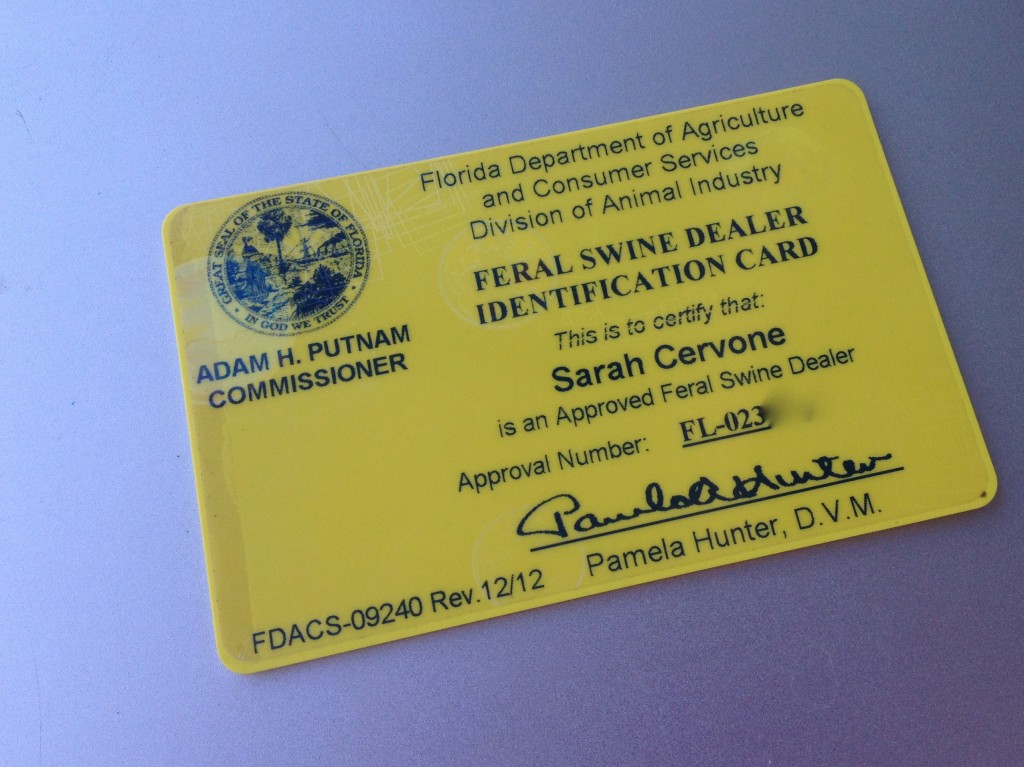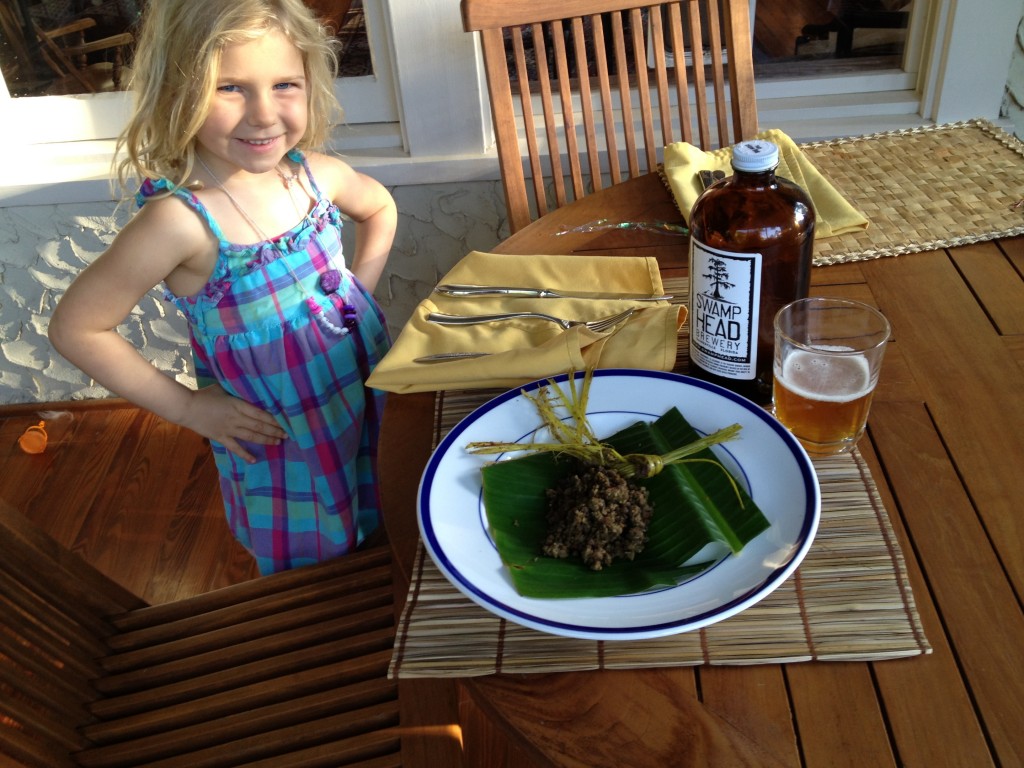Don’t we kinda already know that factory-farmed animals are not frolicking in the fields by day, slumber partying in the barn at night like the animals in the children’s book The Big Red Barn?
 Plenty of films, videos, photos and articles detail the lives of animals in the industrial food supply. Together they don’t tell a happy story. Until recently, I have avoided delving deeply into such information because I wasn’t prepared to stop eating meat. Nor did I want to pay to eat grass-fed meat imported from as far away as New Zealand. I wanted another option, one that started more like the Big Red Barn and ended on my plate. I decided to look around my neighborhood of Gainesville, Fl., for a local purveyor of meat.
Plenty of films, videos, photos and articles detail the lives of animals in the industrial food supply. Together they don’t tell a happy story. Until recently, I have avoided delving deeply into such information because I wasn’t prepared to stop eating meat. Nor did I want to pay to eat grass-fed meat imported from as far away as New Zealand. I wanted another option, one that started more like the Big Red Barn and ended on my plate. I decided to look around my neighborhood of Gainesville, Fl., for a local purveyor of meat.
Sarah Cervone and Casey Whitford own and operate Wild Man Foods, which sells meat and seafood products, including wild hog, Florida Atlantic shrimp, grass-fed buffalo and in-season berries and mushrooms, at local farmers’ markets. They also supply products to grocery stores and local restaurants.
Whitford comes to the business with an interest in paleo-principles, believing that the healthiest human diet is meat and vegetable based, with low-to-no grains, sugars and processed foods. Cervone, on the other hand, is a former vegetarian and she strongly promotes the need for humane production of meat.
“Industrial farms push their methods underground,” Cervone said, which begs the question: What do these farms have to hide? Well, in the case of pork production, a lot.
At some massive hog farms workers follow the common practice of beating piglets to death by swinging them over their heads and slamming them on the ground as this undercover video, filmed by Mercy for Animals, shows (Warning: This is a graphic film of abuses).
The standard practice at industrial hog farms is to cram grown sows into gestation crates so small they can’t turn or lie down for most of their breeding lives. While in 2002, Florida became the first U.S. state to ban gestation pens and eight other states have since followed, many farms still raise sows in the pens. More states, such as NJ, are working to pass similar legislation banning them. Some restaurant chains and national grocery chains have signed a pledge to refuse to buy meat from farms still using them. It is a start, but Cervone has another suggestion.
“People need to meet the producers,” said Cervone, who recommends a policy of purchasing food from local farmers with an open-door policy. “Be your own inspector. Visit the farms. Don’t take other people’s word for it.
“The profit motive is a major source of the problem with the industrialized food system and with some of the smaller-scale systems as well,” Cervone said.
When producers shave costs to improve profits, living animals tend to be treated as part of a mechanized system and regulatory standards drop. Matt Rice, of Mercy for Animals, which filmed the undercover hog video, said of these methods, “The difference is we find it appalling; they find it profitable.”
As a local producer, Wild Man Foods tries to keep costs down to make their product an affordable option to as many people as possible. In their booth, wild hog cuts run about $7 a pound.
“When you are getting [meat] for a dollar a pound, you need to consider how it was produced,” Cervone said. “Its environment, how it is mentally, how it is raised morally. Stressed-out meat is low in nutritional value. At farmers markets you get quality. You don’t need to tell me what pork costs at Hitchcock’s. I wouldn’t touch it.”
Cervone, the mother of a teenage daughter, said she has made material sacrifices to participate in this business. She said doesn’t operate the business solely to make money. Building community is an equally important part of running the business. Whitford and Cervone swap foods for vegetables and other things they need at the farmers market. When other farmers need help, they lend a hand.
“There is reciprocity,” she said. “If we need something done, people help us and we do the same. The producer/consumer relationship is different on the local level. Customers become your friends.”
Wild Man Foods
Cervone, who earned a Ph.D. in anthropology from the University of Florida, said she began to learn about agricultural systems while doing her fieldwork in Morocco, where food production was part of everyday life. While writing her dissertation in 2009, she bought a chicken from Whitford, who was selling smoked fish at the time, and a partnership blossomed.
“We get these crazy ideas and we actually do them,” Cervone said. “It is hard to do it alone; it’s good to have someone to work with, and to have a network of others who are also doing the same thing.”
One of those crazy notions they have put into practice was to trap wild hogs – which survive on a diet of acorns and other foraged foods – butcher them, and sell the meat. Wild hogs are an invasive species in Florida and cause extensive damage to native ecosystems, so capturing them on private lands not only creates a product, but also provides a free service to landowners who want to clear their property of the pests.
Cervone and Whitford’s trapper killed, gutted and sometimes skinned the hogs before shipping them to the butcher. Eventually, the USDA agents shut down the pair for the practice of killing and gutting the hogs on site, as any hunter might do.
“Now that we have become legal, we produce things the same way as before, with one change. Now we truck the hogs live to the butchers,” Cervone said. “We didn’t do that before because we didn’t want to subject the animals to transport before butchering.”
 For their next project, Cervone and Whitford are rebuilding a herd of water buffalo from the remnants of one maintained by the late Hugh Popenoe, a former UF professor, who sold water buffalo meat as a side project. While not wild animals, water buffalo are better adapted to the climate and forage of Florida than are cows, according to Popenoe’s research, so they stay healthier and need little extra care. Additionally, the meat contains less fat than cattle’s meat, making it healthier for humans.
For their next project, Cervone and Whitford are rebuilding a herd of water buffalo from the remnants of one maintained by the late Hugh Popenoe, a former UF professor, who sold water buffalo meat as a side project. While not wild animals, water buffalo are better adapted to the climate and forage of Florida than are cows, according to Popenoe’s research, so they stay healthier and need little extra care. Additionally, the meat contains less fat than cattle’s meat, making it healthier for humans.
Cervone and Whitford’s plan is to offer shares of water buffalo steer – so people can take part in cooperative production – for as little as $2 a pound. “Cooperative steer,” Cervone laughed. “Another crazy idea that will actually happen!”
I bought some ground water buffalo from Wild Man Foods and made a traditional Thai dish following a recipe from Saveur Magazine using kaffir lime, cilantro and lemon grass grown in my garden. I served it on a banana leaf just like the picture in magazine (living in Florida has its perks, people). I accompanied it with locally brewed beer from Swamp Head Brewery. The meal was not only locally grown but also delicious.
 In my opinion, eating meat in moderation is not a bad thing. I will pay more for what I do eat, but it will be better quality. My diet at the moment contains too much meat to make me think I’m walking lightly on the earth. I aim to introduce three vegetarian dinners a week to our family’s menu.
In my opinion, eating meat in moderation is not a bad thing. I will pay more for what I do eat, but it will be better quality. My diet at the moment contains too much meat to make me think I’m walking lightly on the earth. I aim to introduce three vegetarian dinners a week to our family’s menu.
I have learned too much about how the majority of grocery store meat is raised to go back and purchase more. I’m turning to local sources. When I told my husband no more factory meat, I interpreted his response as a challenge: “But where are you going to buy chicken then?”
My next mission: locally grown chicken and turkey. I’ve got some leads.
Where to find alternative products in Gainesville (Other towns might have similar options)
Farmers’ Markets
Union Street Farmers Market in downtown Gainesville. On Wednesday afternoons you can find Wild Man Foods and a variety of other vendors.
Alachua County Farmers’ Market is North Central Florida’s original farmers’ market.
Haile Plantation Farmers Market is accessible to those living in southwest Gainesville.
Local Groceries
Citizens Co-op is a community-owned market with organic options.
Ward’s Supermarket is a locally owned and operated grocery store that stocks organic meats and Florida farm-raised produced.
UF Meat Processing Center sells meat raised in the UF agriculture program.

When I think of Denise’s kitchen, I think pork. Glad you’re pursuing more humane ways of bring the bacon home.
Thanks Amy! It is about time!
Just had some Cognito Farm bacon last night. Fabulous!
Pingback: Caution: Bacon Making in Progress |